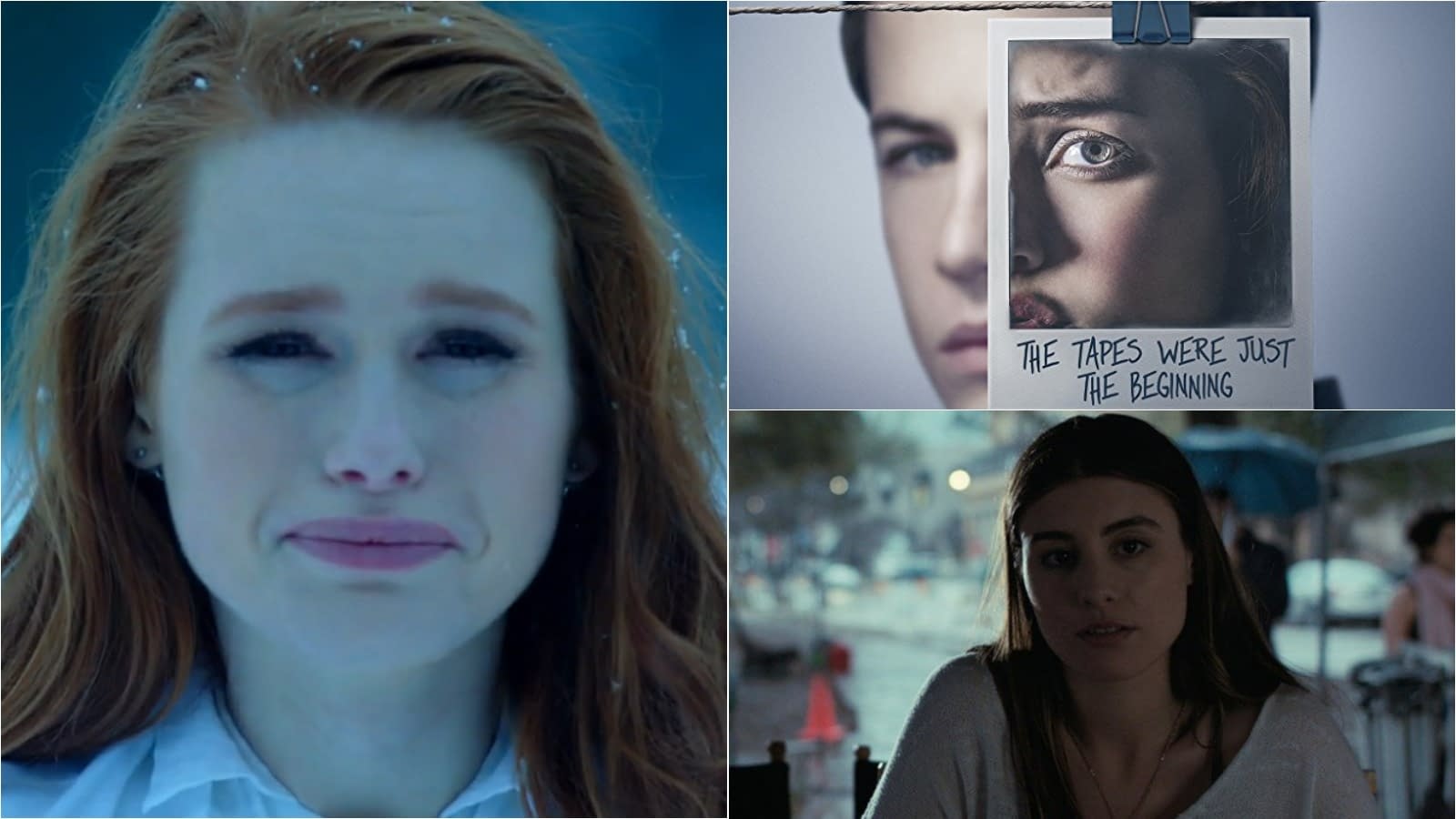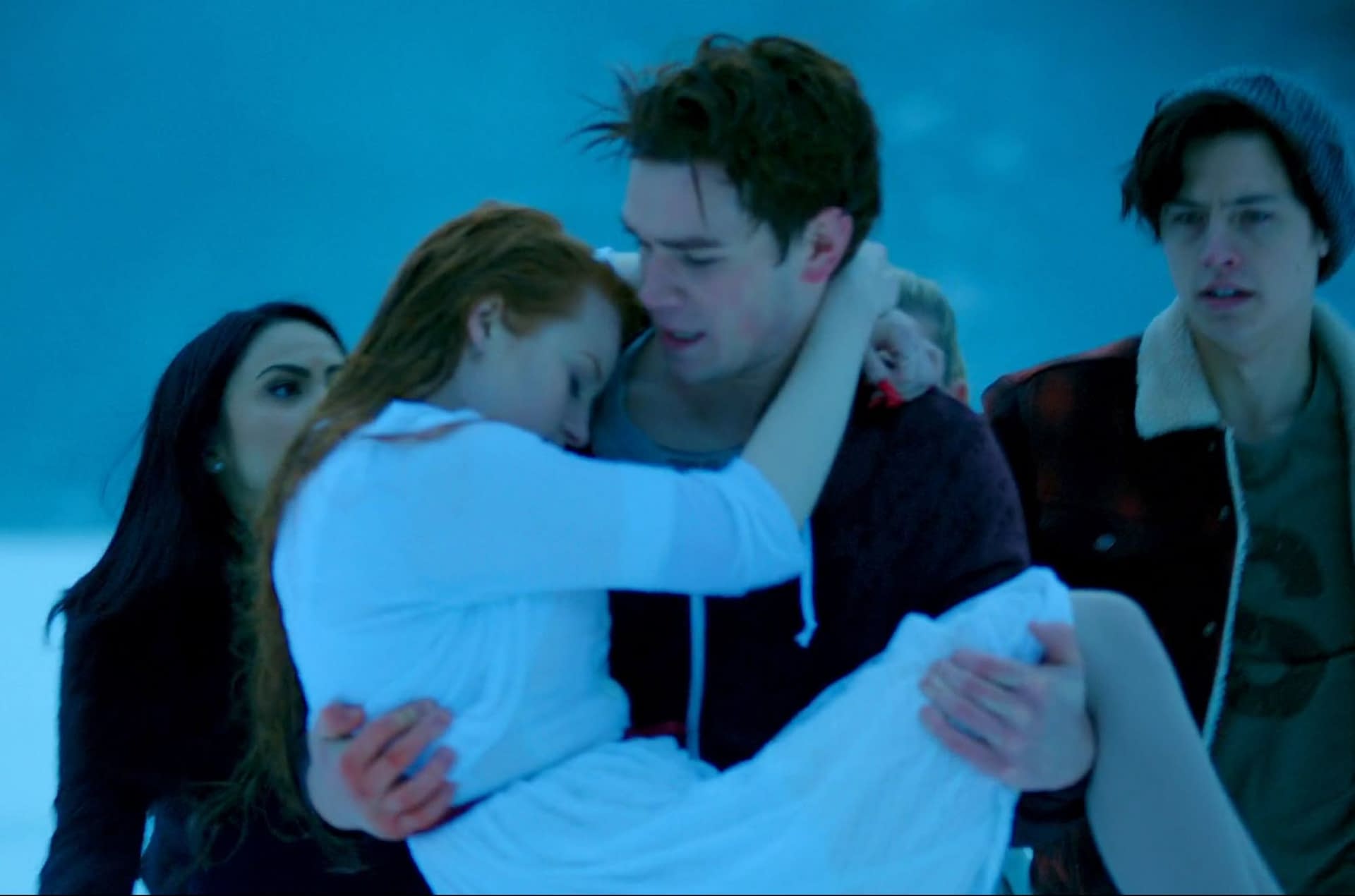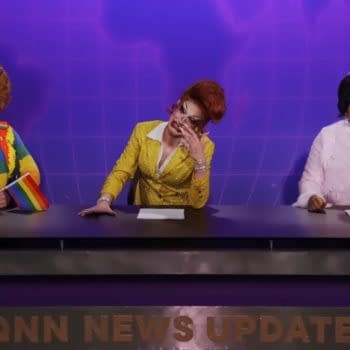Posted in: CW, Netflix, Review, Riverdale, streaming, Trailer, TV, USA Network | Tagged: 13 reasons why, bleeding cool, cable, cw, mr robot, netflix, opinion, riverdale, streaming, television, the cw, tv, usa, USA Network
"13 Reasons Why" "Riverdale" & "Mr. Robot": Suicide, Manipulation, and Why Television Needs to Be Better [OPINION]
This is a topic I don't see talked about a lot, but after seeing it pop up pretty frequently this year, I think it's something that should be addressed – especially when looking at Netflix's 13 Reasons Why, The CW's Riverdale, and USA Network's Mr. Robot.
First things first, please take care of yourself. I love the fact that you're around and would like to keep it that way, no matter how tough things may seem at the moment.
If you are in a self-harm state of mind, call the National Suicide Prevention Lifeline is 1-800-273-8255 or text the Crisis Text Line by texting HOME to 741741. Before you make plans, please at least reach out to trained counselors.

After 13 Reasons Why aired and became massively popular, I saw an alarming amount of increase in television depiction of suicide. True, it has been around and used as a story device for drama for quite awhile (Well, since at least Shakespeare), but this was different.
Why? Because it didn't just show suicide – it centered around manipulation in regards to suicide.
Now, there are two different ways this goes, and sadly, I have television examples for both.
In Netflix' 13 Reasons Why, the main character is given power over the living in death by holding everyone who's wronged her personally responsible for her killing herself. The deceased is manipulating the living.
In the most recent season of Mr. Robot, multiple characters experiencing crisis have been coerced into suicide by the actions or words of other characters. The living manipulate the suicidal.
Both of these are deeply problematic, but let's take a better look at them both.
With 13 Reasons Why, the main issue here is the power it gives the deceased. (Perhaps most importantly, the perceived power over others that it gives the suicidal person).
I know death is sad and grief and tragedy are overwhelming, but suicide is a more complicated mixed bag of different emotions. Anger, resentment, and guilt are among the most popular of the emotional grab bag from the situation. The show does depict these emotions from those she left behind, but it mostly plays on the aspect of "you did this" guilt.
What you have to understand, as a loved one of someone who has killed themselves, is that it is not your fault.
When someone kills themselves, the first thing to realize is that 1) This was a result of their own compounded issues that 2) You are not responsible for nor are you at fault for any of that person's issues.
I know it's hard to believe, there's always the nagging "if only" thoughts, but suicide is a personal choice. It may not feel like it's a choice, often it feels like the only option, but it is a choice, and one that the person themselves ultimately makes – nobody else.
My point being, 13 Reasons Why paints suicide as a form of revenge, a way to get back at those who wronged you and saddle them with the guilt of your death, which is an appealing notion to those struggling with the issue.
Of course, it is easy to point to 13 Reasons Why as a poor example of onscreen suicide depiction; the whole show premise is about revenge by suicide. So let's take a closer look at Mr. Robot and Riverdale, both of which depicted manipulative suicide as well.
This season, both Riverdale and Mr. Robot had characters who were coerced into killing themselves by another person. That's another tool that can be used to shift responsibility for one's death away from mental health and onto another person, which can be just as dangerous as outright blaming others. And in the mind of someone struggling with suicide? It's just as much of a reason.
I've been there, I get the mental "pros and cons" list that constantly feels bogged down on the "pros" side while you constantly struggle to find just one reason to keep you from going through with it.
There are many manipulative people who either actively or inadvertently seek to control those around them; when showing this onscreen in regards to death and specifically suicide, care must be taken so that the action is not depicted as something heroic and the show itself doesn't inadvertently cause a struggling viewer to see that as the best form of escape.
My point is, if you show suicide the wrong way, people could get ideas like, "Tyler did XYZ to me; I'm suicidal anyway, but maybe he'll learn his lesson if I blame him for my death". That is much more appealing to a sick mind than accepting the reality that it is a choice sparked by a disease.
Or it could be in the form of a character amplifying their own depression thoughts and anxieties. "You did this thing and it screwed up this many people. You don't deserve to live, you have nothing to live for anyway. They're happy and you never will be; you're better off leaving them alone."
Both of these lines of faulty "depression logic" paints suicide as an appealing option. And in both of the shows, they follow through, and the story is pretty much better for it.
That is a big problem.

This is irresponsible way to handle the subject, and I'm not the only one who thinks so.
Earlier this year, the National Institute of Health (NIH) released a study that recorded a spike in the suicide rate among the show's demographic in wake of its release. This has since opened the conversation (of what I think is an obvious observation) that young people are especially prone to getting ideas from what they see depicted in the media.
It's why shows and movies with youth-specific gun violence (like the Heathers reboot series that was doomed from the start) rarely if ever make it to air; in a post-Columbine America, it terrifies us that we would give kids ideas to do something similar and encourage such a loss of life.
So is suicide treated differently and why? Good question.
It's exactly this reason why the book the show is adapted from only made the American Library Association's list of top 10 most challenged books once it was publicized that Netflix was adapting it. Why? Because the book, which was a New York Times bestseller upon its release a decade prior, supposedly shows a more nuanced and rounded side of the situation – far less destructive than the show.
There are and have been guidelines in place for depicting suicide in not only movies and television, but news broadcasts and even print journalism. The number one worry is those in crisis who may get the idea to imitate the situation they see on screen or read about.
This is why all media is advised not to show the direct action and not to give exact details of the situation. There are several other guidelines and the reasoning in the Action Alliance's most recent guide, if you care to read it. Needless to say, these shows aren't exactly a shining example of depictions of the topic.
We in the media don't need to mess with that by creating content – especially content aimed at teenagers and young adults (the demographics most prone to struggle with suicide) – that encourages any more loss of life. We need to do better, Hollywood. Tacking a hotline onto your episode isn't going to solve the problem, it's just going to make you feel less morally culpable.
Don't get me wrong – those hotlines and resources should be there, and it's a good start that they are, but we also need to fix the content itself in addition to providing phone numbers and websites. Because sometimes, the visual visceral medium of media speaks to us when nothing else really gets through. And we better be damn sure we're saying things that matter.
To everyone who thinks, "It's just a TV show. If you don't like it, go back to your Disney movies, no big deal," I'd like to tell you my story. I had a boyfriend who killed himself after I broke up with him. No, there wasn't direct media correlation, but maybe if there was a better representation of the realities of how it affects other people, things would have been different.
I cannot begin to tell you what the survivor's guilt of that feels like. To have somebody else place their death on you is not only a burden you didn't agree to, but it's abusive behavior. It is wrong and you do not deserve that – nobody deserves any of those feelings forced upon them. Depression leads to irrational, clouded thinking, also meaning that the person is extra susceptible to the power of the media and suggestion.
With shows that follow through, showing a character who kills themselves garnering the exact response they wanted from their suicide or having another character justify their suicide is beyond dangerous; it illustrates exactly how lonely, depressed people can get finally get their way and be in control of an out of control situation where hopelessness rules all.
Now, to see a show released that all but encourages people who are struggling to inflict this hell on their loved ones? Screw. You. If you're going to show suicide, show all the harsh realities of what the people in your life deal with now. Show the night terrors, the anger, the uncontrollable sobbing at stupid things like bunnies or couples holding hands or songs on the radio.
Show the anxiety, the distractions, drinking, substance abuse, trying to always stay busy, doing anything to quiet the demons in your head; show the self-hatred and loathing for wanting to move on with your life, trying to explain to friends why spring always makes you irritable, finding a way to tell romantic interests that your emotional baggage includes a dead ex-boyfriend who killed himself and blamed you.
Show the real side effects of suicide and trauma on those blamed. It's a hell of a lot less glamorous, but I bet it would cause people to actually stop and think about all the flurry of unpleasant emotions they are about to put their loved ones through, and if they actually deserve that.
That is what shows like Riverdale and Mr. Robot and 13 Reasons Why don't show you – the weight of death on the people left behind or the remorse and regret that comes with an attempt on one's life. The only solution it offers is suicide, which is the opposite of helpful for everyone dealing with the situation.
If you or a loved one is in crisis, please call the National Suicide Prevention Lifeline at 1-800-273-8255 or text the Crisis Text Line by texting HOME to 741741. Trained counselors are ready to talk or chat 24/7, especially around the holidays.














